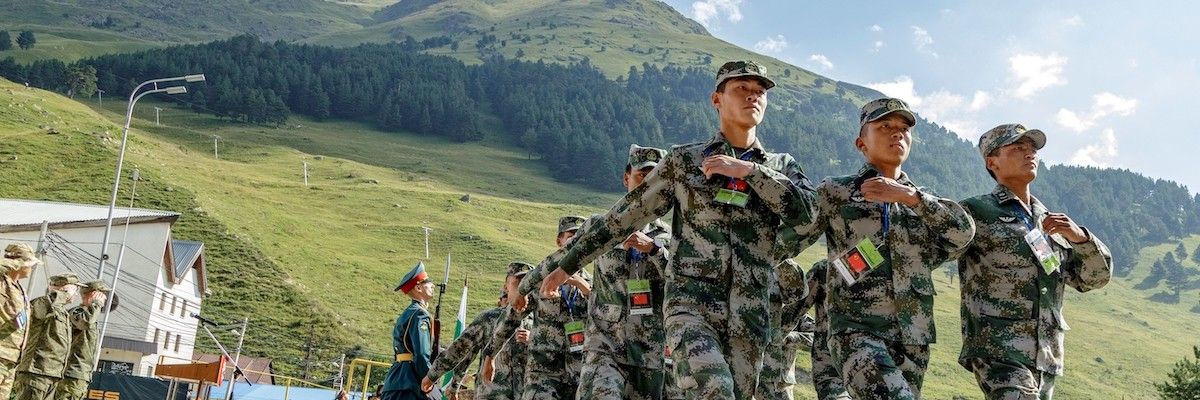Before you read another article claiming that U.S.-China relations are entering dangerous territory, or that Beijing is closer to invading Taiwan, leaving the United States on the precipice of war in its defense, ponder these two critical questions:
Why Would China Attack Taiwan?
Over the last decade Taiwan invested $188.5 billion in China, more than China’s investment in the United States. In 2019 the value of cross-strait trade was $149.2 billion. China applied in September to join the new Comprehensive and Progressive Agreement for Trans-Pacific Partnership. A week later, with no opposition voiced by Beijing, Taiwan also applied to join. China is Taiwan’s largest trading partner. "One country, two systems" has not only kept the peace for decades, it has proven damn profitable. Why bomb one of your best customers?
Why would China consider a war that would provoke the U.S.? Total Chinese investment in the U.S. is $145 billion. U.S. investment in China passed $1 trillion. The Chinese are literally betting the house on America's success.
A failed invasion of Taiwan would topple Xi if not the whole power structure. An invasion is impractical. Chinese amphibious forces would be under fire from Taiwan's F-16s armed with Harpoon missiles practically as they left harbor. Taiwan will soon field a land-based anti-ship missile with a 200-mile range. China would need to land a million soldiers on day one (on D-Day the Allies put ashore 156,000.) China's primary amphibious assault ship carries about only 1,000 men, and China currently has only three such ships. Its conscript troops are unbloodied in combat.
Meanwhile American and allied forces patrol the waters. Aircraft from Guam, Okinawa, and Korea could shut down the skies, and decimate Chinese aircraft on the ground. This is not another of the counterinsurgency struggles which defeated America. It is a Big Power conflict, a war the U.S. has been preparing to fight against someone since the 1960s. (Though analysts like to point to a classified war game last year that saw the American forces "failing miserably" in a battle over Taiwan; and another by the Air Force, which succeeded in repelling China, but with significant losses.)
What about the irrational actor scenario? Discard it. Chinese leaders have always believed in historical cycles. They waited close to 300 years to end the foreign Qing dynasty. They waited out Britain for hundreds of years for the peaceful return of Hong Kong, same with Portugal and Macau. Chinese diplomacy is patient, not reactive. There is no fierce urgency to reunification. One waits to win.
Why now?
In fiction one of the important tools is the Change Event, the thing that answers the question of "why now?" Why did the mild-mannered accountant suddenly become a vigilante? Oh, his daughter was kidnapped. So where is the "why now" part of China-Taiwan?
One of the most compelling arguments behind the idea that China is not planning a war is it hasn’t yet fought any wars. No shots have been fired over the disputed islands, which have been disputed for decades. Taiwan broke away in 1949, and the last shot fired was in the 1950s. Chinese troops entered Vietnam only after the U.S. began its own campaign of regime change there, and again briefly in 1979 during a border scuffle. China joined the Korean War only after the U.S. threatened to cross into Chinese territory. Xi's reunification rhetoric is essentially the same as Mao's.
China is an autocracy (unchanged since 1949), and has not promoted things like free speech in Hong Kong or Tibet, never mind in Beijing or Shanghai. We don’t have to like that, but it is nothing new and has nothing to do with invading Taiwan. China did little when some of the leaders of the Tienanmen protests turned up in Taiwan, another worried-over “why now” event.
My own first brush with a "why now" event was in the 1980s, when I went to Taiwan as an American diplomat. Taiwan was crawling out from under 30 years of authoritarian rule. After decades of speech suppression, people were testing their legs, saying all sorts of crazy stuff about independence. Among ourselves, we called it "the D word," as independence in Mandarin is romanized duli. One emerging political party was even called the Taiwan Independence party, and was likely to grab a few seats in the legislature. The U.S. mission was fearful; "Big China" had made it clear independence was a red line. Beijing's reaction was soon apparent: Taiwan's stores started to feature mainland goods; the end of the hated Kuomintang opened up a new market.
Even before this thaw, you could sort of fly from Taipei to China, something that many people on both sides were desperate to do to visit relatives. The catch was the flight had to touch down in then-British Hong Kong. In 2008 these flights were made direct, with no need for the Hong Kong stopover. Today six China-based airlines and five from Taiwan operate direct flights. Pre-Covid, travelers from China made 2.68 million visits to Taiwan. The line of progress has been in one direction, far at odds with war.
***
Post-Afghanistan, some speculated the U.S. would not defend Taiwan; others, like myself, believe that if Washington stood on the sidelines as China attacked, that would end the post-WWII U.S. alliance system in Asia, and would tempt war on the Korean peninsula. It may spur Japan and Korea to go nuclear.
The Taiwan Relations Act — as a young senator, President Biden voted for it — says Washington will "consider any effort to determine the future of Taiwan by other than peaceful means, including by boycotts or embargoes, a threat to the peace and security of the Western Pacific area and of grave concern to the United States" and the U.S. will "maintain the capacity to resist any resort to force or other forms of coercion that would jeopardize the security, or the social or economic system, of the people on Taiwan." The language was purposefully written in 1979 to convey "strategic ambiguity." Voices today want to strip that ambiguity in order to make it clear that Washington would indeed respond militarily to a Chinese invasion of the island.
I am not sure that is even necessary. I have been in rooms with both Chinese and Taiwan representatives, and PLA and U.S. military personnel. Though sabers get rattled, particularly in front of the cameras, every action by every player understands Washington is behind Taipei. When Joe Biden recently broke code and blurted out the U.S. will indeed defend Taiwan, it was one of the few honest statements by any politician in Washington.
China sees that the U.S. has now commandos on Taiwan. Washington sells Taiwan modern weapons and Congress wants to sell them more. Even as Xi spoke of reunification during the October political holidays, the U.S., U.K., and Japan conducted joint operations in the China Sea, and Washington is selling nuclear submarines to Australia to boost patrols in the South China Sea. Meanwhile the United States brought India into the Quad Pact, ostensibly as a security hedge against China, and convinced Japan to sign a joint statement signaling a break from its neutral stance on Taiwan. Congress will take up the Taiwan Invasion Prevention Act, which authorizes Biden to initiate war on China. It only adds up one way.
The question remains then, if there are no tangible incentives or excuses for China to invade Taiwan right now, why do we seem to be asking for it, knowing it very well may push us into an unnecessary conflict we cannot afford and may not win?
Over 70-plus years the China-Taiwan relationship has become more open, profitable, and interactive. Strategic ambiguity has worked for all sides. Nothing about any of that has changed. Washington needs to ponder this and beware of what it seems to be asking for.
















